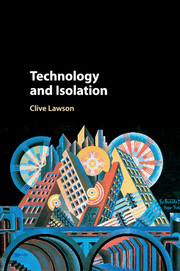Book contents
- Frontmatter
- Dedication
- Contents
- Preface
- Acknowledgements
- 1 Technology Questions
- 2 From Obscurity to Keyword: The Emergence of ‘Technology’
- 3 Ontology and Isolation
- 4 Science and Technology
- 5 The Sociality of Artefacts
- 6 Technological Artefacts
- 7 Technology and the Extension of Human Capabilities
- 8 Technology and Instrumentalisation
- 9 Technology and Autism
- 10 Technology, Recombination and Speed
- 11 Marx, Heidegger and Technological Neutrality
- Bibliography
- Index
10 - Technology, Recombination and Speed
Published online by Cambridge University Press: 14 April 2017
- Frontmatter
- Dedication
- Contents
- Preface
- Acknowledgements
- 1 Technology Questions
- 2 From Obscurity to Keyword: The Emergence of ‘Technology’
- 3 Ontology and Isolation
- 4 Science and Technology
- 5 The Sociality of Artefacts
- 6 Technological Artefacts
- 7 Technology and the Extension of Human Capabilities
- 8 Technology and Instrumentalisation
- 9 Technology and Autism
- 10 Technology, Recombination and Speed
- 11 Marx, Heidegger and Technological Neutrality
- Bibliography
- Index
Summary
In this chapter I want to develop the idea, introduced in Chapter 6, that recombination plays an important role in explaining some of the special characteristics or properties that are often associated with technology. That recombination plays an important role in our understanding of technology is a suggestion that has gained prominence in recent years within some strands of mainstream economics. However it is not a new idea, and can be traced back at least to contributions to the sociology of invention literature of the 1920s and 30s. Moreover, as noted above, a focus on recombination was also central to the work of Clarence Ayres. The aim of this chapter is to review the different conceptions of recombination that emerge in these different literatures and highlight their strengths and weaknesses. I argue that some conception of recombination marks a positive development in all these traditions. However, I also argue, drawing upon ideas from earlier chapters, that for a conception of recombination to be of much use it must both be given a more ontological formulation and be combined with a more complex conception of technology. The advantages of this reformulation are illustrated by briefly considering the contention that modern societies can be understood to be speeding up or accelerating.
From Production Functions to Recombination
As noted above, a common criticism of standard mainstream economics is that it pays little attention to the study of technology, or more precisely there is little concern with the nature of technology. Within mainstream accounts, technology's presence is felt via the stipulation of different relationships between inputs and outputs. At most, technology is conceptualised as some kind of ‘menu’ that is intended to capture constraints placed on human action in relation to production (Metcalfe, 2010). These constraints are left unexplained, in the sense that their explanation is thought to lie outside the purview of economics proper. Given these constraints, however, economists are concerned with what can be said about the relations of inputs and outputs, information typically summarised in terms of the shapes and properties of production functions. In this case, questions about technology reduce to questions about the efficiency with which inputs generate outputs, the relative proportions in which the inputs are employed and the ease of substituting one input for another. None of these issues requires much consideration of what technology might be.
- Type
- Chapter
- Information
- Technology and Isolation , pp. 160 - 176Publisher: Cambridge University PressPrint publication year: 2017



